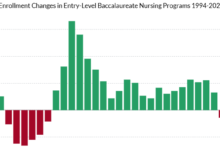What is Behavioral Health Nursing Specialty & Who Works In This Field?

Behavioral health is one of over a hundred nursing specialties registered nurses (RN) can choose between as they work to further their career, education, and interests. Choosing to pursue a specialty is exciting and yet can be overwhelming as well. Do you think behavioral healthcare might be the pursuit for you?
Behavioral health might be precisely suitable for you! Here, we’ll explore the meaning of the term and how that applies to the specific tasks you can expect to be part of a job description for an RN in behavioral health. We’ll further explore the characteristics and interests of nurses who find satisfaction in this specialty so they can make more informed decisions.
Is Behavioral Health the Same Thing as Mental Health?
The term behavioral health is often confused with mental health. While this confusion of terms isn’t far-fetched, it isn’t quite right. Behavioral health is a broader term than mental health. The World Health Organization (WHO) defines mental health as:
“Mental health is a state of mental well-being that enables people to cope with the stresses of life, realize their abilities, learn well and work well, and contribute to their community.”
In contrast, behavioral health is defined as: “Behavioral health describes the connection between behaviors and the health and well-being of the body, mind, and spirit.” Perhaps, that is still a little too vague. Ultimately, behavioral health refers to your mental health and behaviors that reflect your mental, physical, and spiritual health.
Behavioral health is more than diagnosing a mental health disorder and prescribing treatment. Behavioral health indicates that we also assess their behaviors and environments and look at their motivations and physical health.
Behavioral Health Nursing Is More than Prescribing Medications
Behavioral health and behavioral science theories are an integral part of public health nursing as well. Public health nursing focuses on making community changes instead of individual differences, often utilizing behavioral health theories. Moreover, the theories can be applied in mental health settings as well. At the same time, most behavioral health nurses work in a mental health treatment environment.
Behavioral science theories focus on changing the behavior of the patient. Some examples of behavioral approaches being used in nursing today include:
- Integrated Behavioral Model
- Theory of Planned Behavior
- Social-Cognitive Theory
- Theory of Reasoned Action
- Health Belief Model
- Transtheoretical Model
What Types of Clinicians Work in Behavioral Healthcare?
Just as the term behavioral health is broad, so is the range of professionals working within behavioral healthcare. If you want a job in behavioral health, you can expect to collaborate with clinicians from the following disciplines:
- RNs and APNs (advanced practice nurses)
- Nurses practitioners (NPs)
- Social workers
- Doctors
- Counselors
- Licensed practical/vocational nurses (LPN/LVNs)
- Therapists
- Psychiatrists
- Psychologists
- Certified nursing assistants (CNAs)
How Much Do Clinicians Earn in Behavioral Health?
Here’s a breakdown of the average salary and hourly wages clinicians earned in 2021 in Mental Health and Substance Abuse (data sourced from the U.S. Bureau of Labor Statistics)
- RNs earned an average salary of $80,260 or $38.59 per hour.
- NPs earned $131,830 annually or $63.38 hourly.
- LPNs/LVNs earned an average of $52,440 per hour or $25.21 per hour.
- CNAs earned $34,480 as an average salary or $16.58 hourly.
You Might Be a Behavioral Health Nurse If:
- You have an interest in behavioral psychology.
- You are interested in the context of your patient’s health.
- You can see your patients as flawed humans (just like everyone else) instead of a number or a problem to be solved.
- You can have compassion while still maintaining personal boundaries.
- You are interested in furthering your education.
- Job security is a priority for you.
How to Find Jobs in Behavioral Healthcare Near You
Download the Nursa staffing smartphone app that brings the entire hiring process from job search to job acceptance to the palm of your hand. With Nursa, you can search for jobs near you, adjust your geographic location, and search again. Hundreds of PRN behavioral healthcare jobs are within your radius, and you can connect to them today.
Job security is absolutely a positive component for nurses working in behavioral healthcare. Search for nursing jobs that include BHU (behavioral healthcare unit), a psychiatric unit, residential care, or mental health.
Working PRN jobs in behavioral health is a terrific way to build confidence that this specialty is the right one for you. You gain experience and can work in various facility settings to determine which setting will allow you, or even encourage you, to work holistically in behavioral health.




